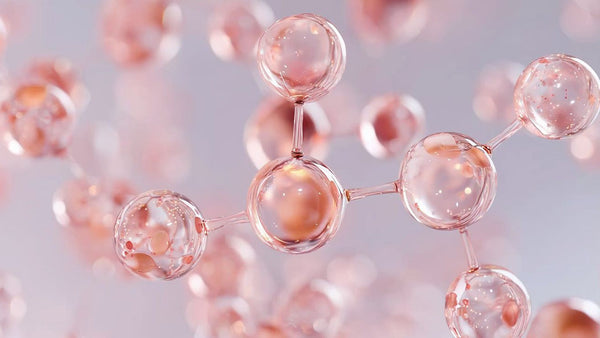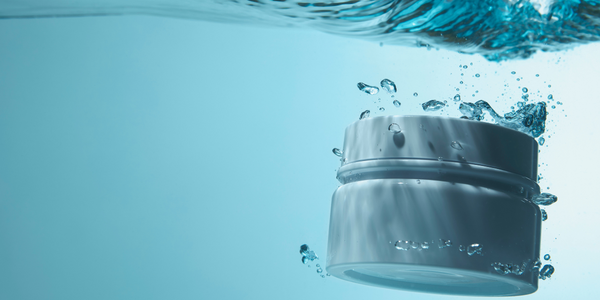Magnesium is a mineral that plays a crucial role in the overall health and well-being of our bodies. It is essential for various bodily functions, including the health of our skin. Let's delve into the details!
Understanding the Role of Magnesium for Skin
Before diving into the benefits of magnesium for the skin, it's important to understand the science behind its role in skin health. Magnesium functions as a cofactor for numerous enzymatic reactions involved in the synthesis of lipids and proteins. It also acts as a regulator of cellular signaling pathways and is essential for maintaining the integrity of the skin barrier.
Furthermore, magnesium plays a crucial role in DNA synthesis and repair within skin cells. This mineral is involved in the activation of DNA repair enzymes, helping to maintain the genetic integrity of skin cells and reduce the risk of mutations that could lead to skin cancer.
The Science Behind Magnesium and Skin Health
In scientific studies, magnesium has been found to enhance the barrier function of the skin, preventing excessive water loss and maintaining optimal moisture levels. It has also been shown to have anti-inflammatory properties, reducing redness and irritation.
Moreover, magnesium contributes to the production of collagen and elastin, which are essential proteins for maintaining skin elasticity and firmness. By supporting the synthesis of these proteins, magnesium helps to promote a more youthful and radiant complexion.
The Connection Between Magnesium and Skin Aging
Magnesium levels naturally decline as we age, and this decline is associated with the formation of wrinkles and sagging skin. By replenishing magnesium levels, we can potentially slow down the aging process and maintain a more youthful appearance.
In addition to its role in preventing premature aging, magnesium also aids in the repair of UV-induced skin damage. Exposure to ultraviolet (UV) radiation from the sun can lead to oxidative stress and DNA damage in skin cells. Magnesium's antioxidant properties help neutralize free radicals and support the repair mechanisms that protect against UV-induced skin aging.
Unveiling the Benefits of Magnesium for Skin and Body
Now that we understand the role of magnesium in skin health, let's explore its benefits in more detail.
Magnesium is not only a powerhouse mineral for skin health but also plays a crucial role in various bodily functions. From promoting skin hydration to supporting overall body health, magnesium is truly a multitasking mineral.
Magnesium and Skin Hydration
Magnesium helps to attract and retain moisture in the skin, keeping it hydrated and plump. This can be especially beneficial for individuals with dry or dehydrated skin, as it helps to alleviate dryness and promote a healthy complexion.
In addition to its hydrating properties, magnesium also aids in the regulation of sebum production, making it a versatile ingredient for all skin types.
Magnesium's Role in Skin Elasticity and Firmness
Collagen is a protein that gives our skin its structure, elasticity, and firmness. Magnesium plays a vital role in collagen synthesis, ensuring that our skin remains resilient and youthful-looking.
Furthermore, magnesium acts as an antioxidant, protecting the skin from free radical damage and reducing the signs of premature aging.
The antioxidant property of magnesium also helps reduce aging signs such as fine lines and wrinkles.
How Magnesium Reduces Skin Redness?
Magnesium helps in soothing irritated, red skin rashes and sensitive skin conditions, along with transdermal magnesium. Hence, magnesium oil sprays are a hype for skincare.
How Magnesium Contributes to Overall Body Health
While the focus of this article is on the benefits of magnesium for the skin, it's worth noting that magnesium also plays a crucial role in maintaining overall body health. It is involved in hundreds of enzymatic reactions that regulate energy production, muscle function, and nerve transmission.
Moreover, magnesium deficiency has been linked to various health issues such as muscle cramps, fatigue, and even heart problems. Ensuring an adequate intake of magnesium through diet or supplements is essential for overall well-being.
Incorporating Magnesium into Your Skincare Routine
Now that we are aware of the extensive benefits of magnesium, it's time to explore how we can include this mineral in our skincare routine. Magnesium plays a crucial role in various skin functions, such as regulating cell turnover, reducing inflammation, and maintaining hydration levels. By incorporating magnesium into your skincare regimen, you can promote healthier, more radiant skin.
Furthermore, magnesium has been shown to help combat environmental stressors that can contribute to premature aging. Its antioxidant properties can neutralize free radicals and protect the skin from damage caused by UV rays and pollution, making it a valuable addition to any skincare routine.
Choosing the Right Magnesium-Infused Products
When selecting skincare products that contain magnesium, it's essential to look for high-quality formulations that are free from harsh chemicals and irritants. Opt for products that have a good balance of magnesium and other beneficial ingredients, such as antioxidants and hydrating agents. Consider products that are specifically designed to deliver magnesium effectively to the skin, ensuring maximum absorption and benefits.
The Ideal Time to Apply Magnesium on Your Skin
One of the best times to apply magnesium-infused skincare products is during your evening routine. This is because our skin goes into repair mode overnight, and providing it with the necessary nutrients, including magnesium, can enhance the rejuvenation process. The calming and relaxing properties of magnesium can also help promote a restful night's sleep, allowing your skin to regenerate and repair more effectively.
Precautions to Take When Using Magnesium in Skincare
While magnesium is generally safe for topical use, it's essential to perform a patch test before incorporating any new product into your routine. This can help identify any potential sensitivities or allergies. It's also crucial to follow the instructions provided by the manufacturer and not exceed the recommended dosage. Additionally, if you have any existing skin conditions or are pregnant or nursing, consult with a dermatologist or healthcare provider before introducing magnesium-infused products into your skincare regimen.
Exploring Transdermal Magnesium
In addition to using magnesium-infused skincare products, another way to benefit from this mineral is through transdermal application.
Transdermal magnesium therapy is a method that involves applying magnesium topically to the skin for absorption. This approach allows the magnesium to bypass the digestive system and enter directly into the bloodstream, potentially providing quicker and more efficient absorption compared to oral supplements.
What is Transdermal Magnesium?
Transdermal magnesium refers to the absorption of magnesium through the skin. This can be achieved via magnesium oil, sprays, or creams, which are applied topically and gradually absorbed into the bloodstream.
Magnesium, an essential mineral involved in various biochemical processes in the body, plays a crucial role in muscle function, nerve transmission, and energy production. Transdermal application offers a convenient way to replenish magnesium levels, especially for individuals who may have difficulty tolerating oral supplements.
The Effectiveness of Transdermal Magnesium Application
Transdermal magnesium has gained popularity due to its claimed effectiveness in enhancing magnesium levels in the body. While more research is needed, some studies suggest that transdermal application may be a viable method for increasing magnesium levels.
Proponents of transdermal magnesium therapy believe that it can help alleviate muscle cramps, promote relaxation, and support overall well-being. However, individual responses to transdermal magnesium may vary, and factors such as skin sensitivity and absorption rates can influence its effectiveness.
Other Strategies to Enhance Skin Texture and Quality
In addition to incorporating magnesium into your skincare routine, there are other strategies you can implement to further improve skin texture and quality.
The Importance of a Balanced Diet for Skin Health
Eating a balanced diet rich in essential nutrients is crucial for promoting overall skin health. Your skin reflects what you eat, so incorporating a variety of foods that are rich in vitamins, minerals, and antioxidants can have a significant impact on your skin's texture and quality. Foods such as leafy greens, fish, nuts, and whole grains not only provide essential nutrients like magnesium but also contain other beneficial compounds that support skin health.
Furthermore, certain nutrients like vitamin C, vitamin E, and zinc play key roles in collagen production, skin repair, and protection against environmental damage. Including a rainbow of fruits and vegetables in your diet can help ensure you are getting a wide range of these essential nutrients to support healthy skin.
The Role of Hydration in Maintaining Skin Quality
Staying hydrated is essential for maintaining skin elasticity and preventing dryness. Water is vital for flushing out toxins from the body and keeping skin cells hydrated from within. In addition to drinking water, incorporating hydrating foods like watermelon, cucumber, and celery into your diet can also contribute to your overall hydration levels.
Moreover, using a humidifier in your home can help combat dry indoor air, which can strip moisture from your skin. By maintaining adequate hydration levels both internally and externally, you can support your skin's natural barrier function and improve its overall quality.
Exercise and Its Impact on Skin Texture
Regular exercise not only benefits your overall health but also has a positive impact on your skin. Physical activity improves blood circulation, which means that more oxygen and nutrients are delivered to your skin cells. This increased blood flow helps nourish the skin from the inside, promoting a healthy complexion and enhancing skin texture.
In addition, exercise promotes the production of endorphins, also known as the body's natural stress relievers. Lower stress levels can have a direct impact on your skin, as high-stress levels have been linked to skin issues such as acne and eczema. By incorporating regular exercise into your routine, you can not only improve your skin's texture but also promote a healthy mindset that reflects positively on your skin.
Conclusion
Magnesium is a powerhouse mineral that offers a myriad of benefits for both the skin and body. By incorporating magnesium into your skincare routine and exploring transdermal applications, you can reap the rewards of this essential element. Additionally, adopting a balanced diet, maintaining hydration levels, and regular exercise can further enhance your skin's texture and quality. Start incorporating magnesium today and enjoy the radiant and youthful-looking skin you deserve.



























 DOWNLOAD NOW
DOWNLOAD NOW
